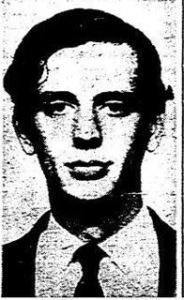George Winne Jr. (April 2, 1947 – May 11, 1970) was an American student who, in protest of the United States' involvement in the Vietnam War, set himself on fire in an act of self-immolation at Revelle Plaza on the campus of the University of California, San Diego. The incident took place less than a month after the American invasion of Cambodia and one week after the Kent State Massacre.[1] Winne's act was inspired by the self-immolation of Buddhist monk Thích Quảng Đức in 1963 in response to the persecution of Buddhists by the regime of minority Catholic President Ngo Dinh Diem.[citation needed]
George Winne Jr. | |
|---|---|
 | |
| Born | April 2, 1947[1] Detroit, Michigan, U.S. |
| Died | May 11, 1970 (aged 23) La Jolla, California, U.S. |
| Cause of death | Burns from self-immolation |
Background
editThe son of a Navy Captain, George Winne Jr. was raised in San Diego. He was rejected from the US Naval Academy due to poor eyesight, but was an ROTC candidate at Colorado School of Mines before transferring to UCSD. He was a history major at Muir College. In December 1969, he became very withdrawn.[2]
Death
editSlightly after 4pm on Sunday, May 10, George Winne lit gasoline soaked rags on his body in Revelle Plaza on the UCSD campus and began running, carrying a sign reading "In God's name, End this war." Graduate student Keith Stowe knocked him down and then attempted to smother the flames: "but it didn't help."[2] Winne suffered third and fourth degree burns over 95 percent of his body, and he died at Scripps Hospital at 2am on the 11th of May, 1970.
At noon on May 11, a memorial service was held in Revelle Plaza. Speakers included history professor and chair of the faculty senate Gabriel Jackson and philosophy professor Herbert Marcuse.[3][4]
Memorials
editFor decades, faculty and students held vigils in remembrance of Winne in Revelle Plaza.[1]
In 1976, sculptor Virginia Maksymowicz installed a project called "Thirty Blocks" in what has become known according to campus folklore as the "George Winne Memorial Grove" to the east of Geisel Library and north of Price Center. While the clay was damp, the sculptor lay down on the bricks leaving an impression of her body and objects from her purse, which were then fired in a kiln to leave an "archaeological record" of her.[5] There is also a small plaque was also installed[when?] in this grove, which reads:
IN HONOR OF GEORGE WINNE JR.
WHO IMMOLATED HIMSELF IN
REVELLE PLAZA IN PROTEST OF
THE VIETNAM WAR IN 1970.
HE HELD A SIGN THAT READ
'IN THE NAME OF GOD,
END THE WAR'
In 2013, a group of students studying the history of progressive activism at UC San Diego, proposed a "memory site" near the location of Winne's act.[citation needed] In the winter of 2014, a "May 1970 Peace Memorial", was installed in Revelle Plaza.[1][6]
See also
editReferences
edit- ^ a b c d Clark, Christine (2014-02-06). "New Campus Memorial Honors Protesters for Peace". UC San Diego Today. Archived from the original on 2022-12-01. Retrieved 2014-02-06.
- ^ a b Yee, Curtis (2017-05-10). "The Death of George Winne Jr. and the Fight for a More Peaceful World". The Triton. Archived from the original on 2017-05-14. Retrieved 2024-05-15.
- ^ Gormlie, Frank (2020-05-11). "UCSD Student George Winne Burned Himself to Death in Protest of the War – May 10, 1970". the student strike of may 1970. Retrieved 2024-06-04.
- ^ Joyner, Owen (1970-05-12). "Student Sets Self Afire; Dies to Protest War" (PDF). Triton Times. Vol. 10, no. 11. p. 1. Archived (PDF) from the original on 2017-07-10.
- ^ Hampton, Dave (2013-05-09). "Fanfare For Maksymowicz: A Campus Legend in the Shadow of 'Fallen Star'". KPBS Public Media. Retrieved 2024-06-04.
- ^ Twohig, Niall (2014-05-17). "Memory Against Forgetting: The May 1970 Peace Memorial at UCSD". San Diego Free Press. Retrieved 2024-06-04.
Further reading
edit- Keen, H. "San Diego student who set self afire in war protest dies", Los Angeles Times, May 12, 1970
- Buchbinder, David (May 7, 1974). In God's Name, End the War. Triton Times, p2.
- Boychuk, Ben (May 15, 2000). 30-Year-Old Tragedy Still Haunts UCSD. The UCSD Guardian, p5.
- Dille, Catherine (May 14, 1990). Students Hold Memorial on 20th Anniversary of War Protester's Death. The UCSD Guardian, p1.
- Schmitt, Walter (May 10, 1990). Remembering George Wynne(sic), Jr.. The UCSD Guardian, p5.
External links
edit- Images Of War - Bricks from the site of Winne's immolation
- Social Architectures – Memorial to George Winne Jr.